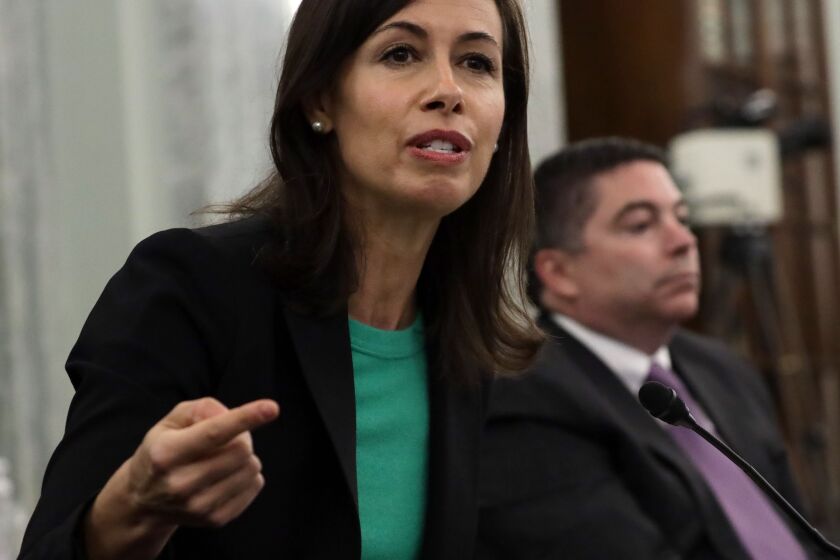Congressional leaders and a media advocacy group are urging the Federal Communications Commission to examine how policy decisions and programs have disparately harmed Black Americans and other communities of color.
In a letter sent to the acting FCC chair, Democratic U.S. Reps. Jamaal Bowman of New York, Yvette Clarke of New York and Brenda Lawrence of Michigan along with Media 2070 said the FCC should conduct an assessment to “address and redress” the harm the agency’s policies and programs have caused Black and brown communities and identify “affirmative steps the agency commits to taking to break down barriers to just media and telecommunication practices.”
The FCC is an independent governmental agency responsible for regulating the nation’s communications by radio, television, wire, satellite and cable.
Twenty-five members of Congress signed the letter.
A lack of diversity and representation has long been a concern for media advocates and others who say racism permeates the nation’s media industry, partly because of historical exclusionary policies and regulations that have made it hard for Black Americans and others to control and shape news coverage and other forms of media.
Media 2070, created by the Black caucus of the nonpartisan organization Free Press, has called for media reparations for the Black community, and the FCC letter is part of its efforts. It sent a petition in June to 3,000 newsrooms across the country, urging news outlets to “dismantle anti-Black racism in the media, trust Black journalists and care for Black communities.”
“Although many journalists and artists of color have used their talent to ensure critical stories about their communities are being told, our nation’s big media companies nevertheless continue to stereotypically depict people of color as being a threat or a burden to society,” the lawmakers wrote in their letter to acting FCC Chairwoman Jessica Rosenworcel. “Historic federal policies are a primary reason why structural inequities exist in our nation’s media and telecommunication systems today. FCC policies, license decisions and inaction have had the result of effectively excluding people of color from media ownership opportunities.”
“The [Trump administration’s] efforts to consolidate the media marketplace limited ownership opportunities for people of color and women,” they wrote.
President Joe Biden signed an executive order in January that directs executive agencies to assess how federal policies have harmed communities of color. Each agency was told to identify potential barriers that underserved communities and individuals face in trying to access contracting opportunities and also whether new policies, regulations or guidance documents are needed to advance equity.
The order also “strongly encouraged” independent agencies, such as the FCC, to conduct an assessment.
An FCC spokesperson said Rosenworcel is “committed to ensuring that FCC policies are equitable, fair and transparent.”
Rosenworcel recently announced a plan to expand the work of the recently renamed Communications Equity and Diversity Council, expanding its mission from its initial focus on the “media ecosystem to review more broadly critical diversity and equity issues across the tech sector.”
People of color own and control 6% of the nation’s full-power TV stations, 7% of commercial FM radio stations and 12% of commercial AM radio stations despite making up more than 40% of the U.S. population. As of 2017, Black Americans owned or controlled less than 1% of television stations, the group said, citing a 2020 FCC report.
“Media control our narrative and control our consciousness,” Bowman said. “And if people of color aren’t owning those spaces and are strategically and just purposely excluded from those spaces, we have to do something about that.”
A 2011 FCC report found that broadcast owners of color and advocates “largely attribute low minority broadcast ownership levels to the Telecommunications Act of 1996, which relaxed the local broadcast ownership rules and led to increased consolidation in broadcast media.” The newspaper and radio industries also have faced rapid consolidation.
The FCC report noted that several studies have concluded that mainstream media outlets don’t adequately cover Black Americans and other communities of color. The famous Kerner Commission report, commissioned by President Lyndon B. Johnson and released in 1968, found that the majority-white owned media outlets failed to cover the 1967 uprisings in Detroit and elsewhere from the perspective of Black Americans in a nuanced and accurate manner.
“The media report and write from the standpoint of a white man’s world,” the Kerner Commission report said.
In 1978, the FCC created the minority tax-certificate program, allowing broadcasters to get a tax break if they sold their stations to people of color. But, in 1995, the Republican-controlled Congress passed legislation that ended the program, which had increased broadcast ownership by people of color from less than 1% to 3%.






